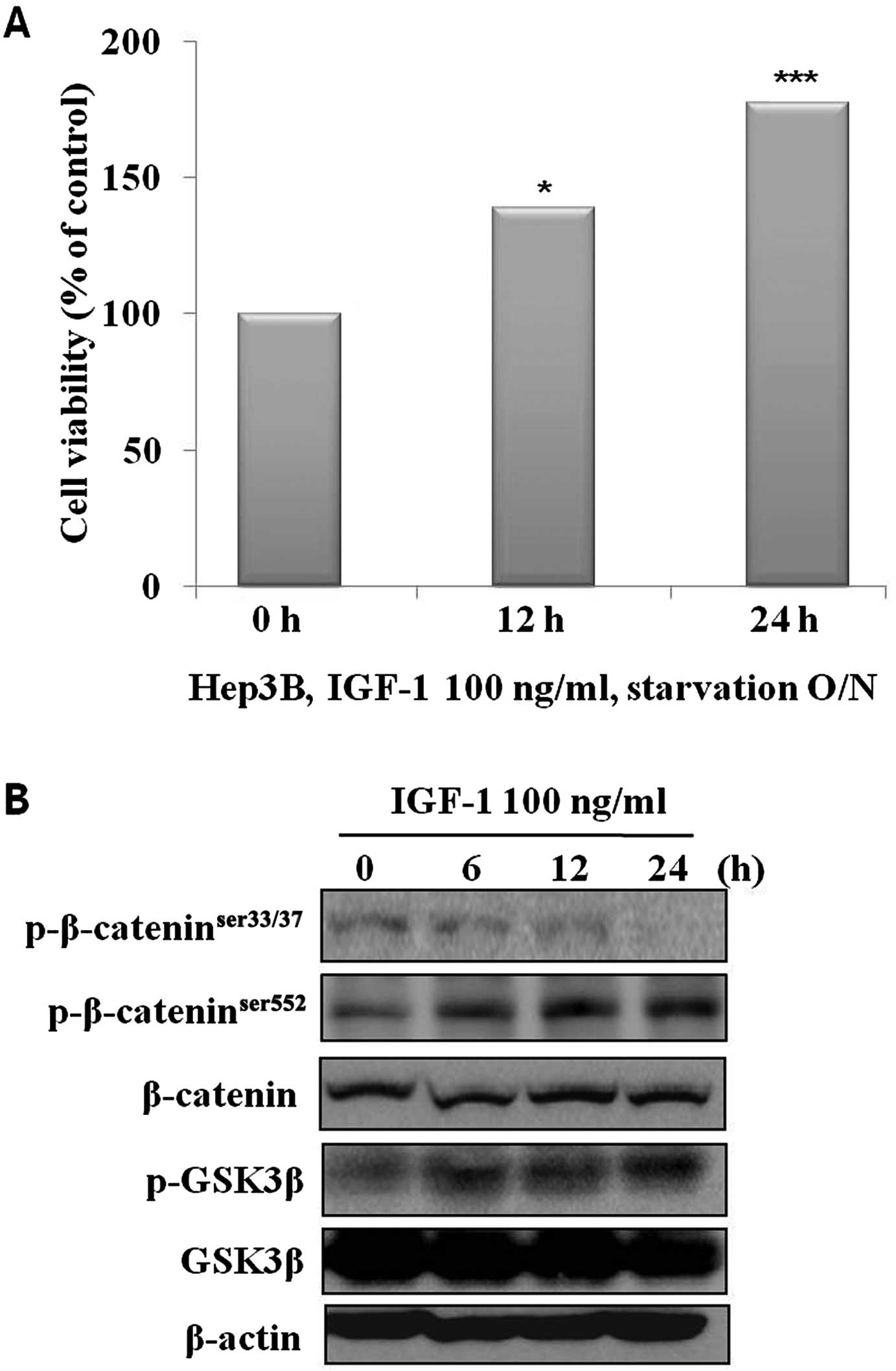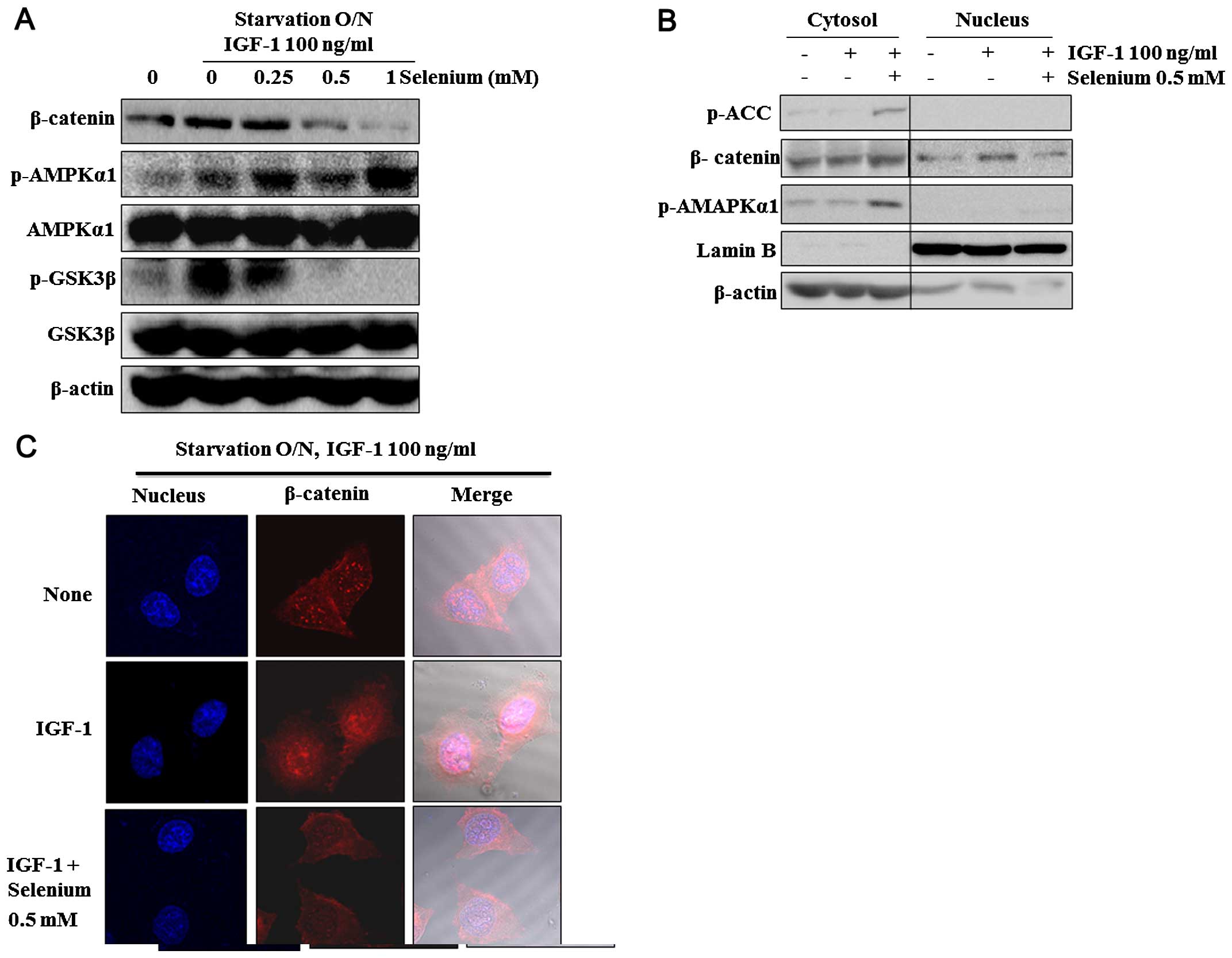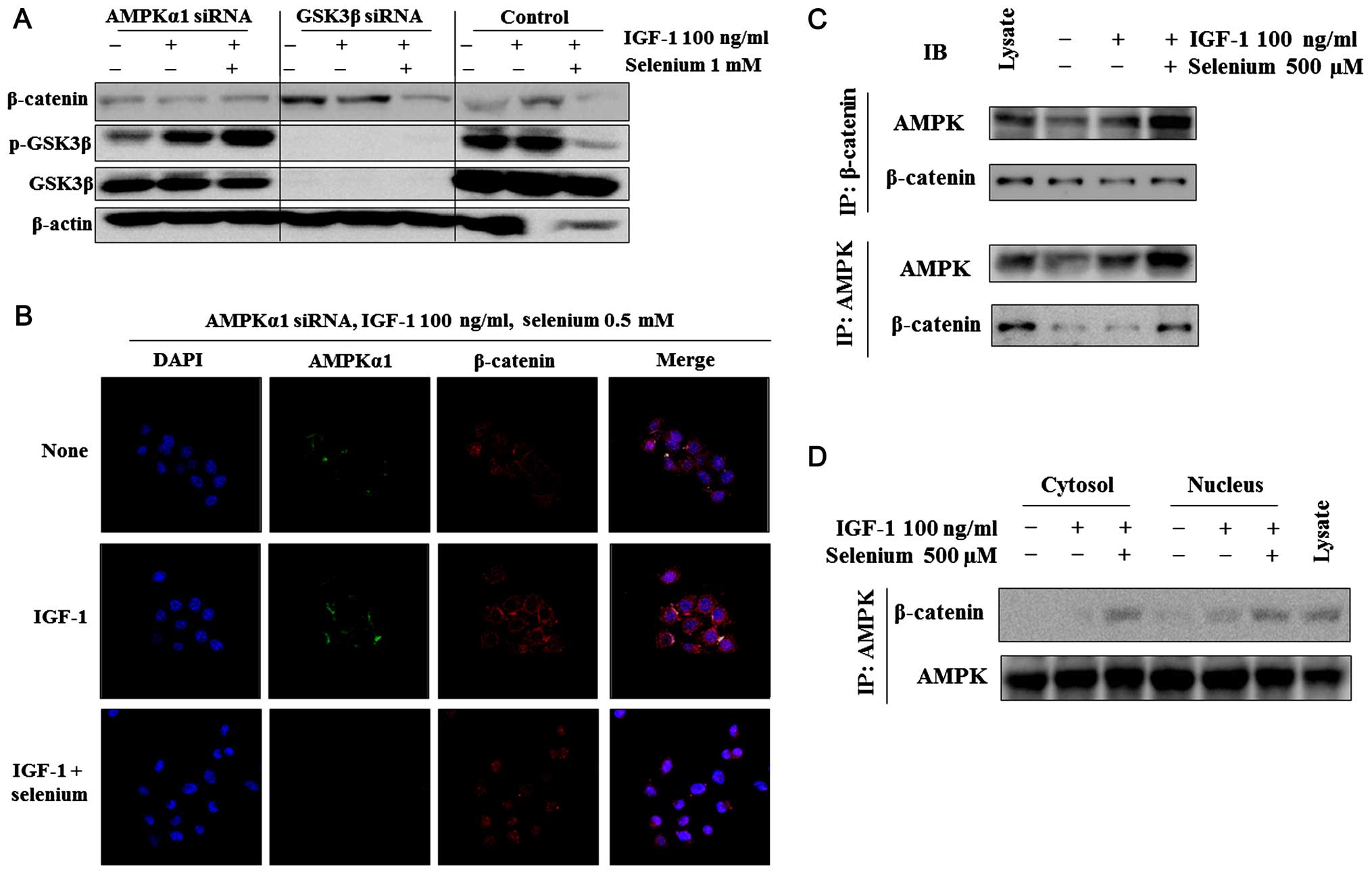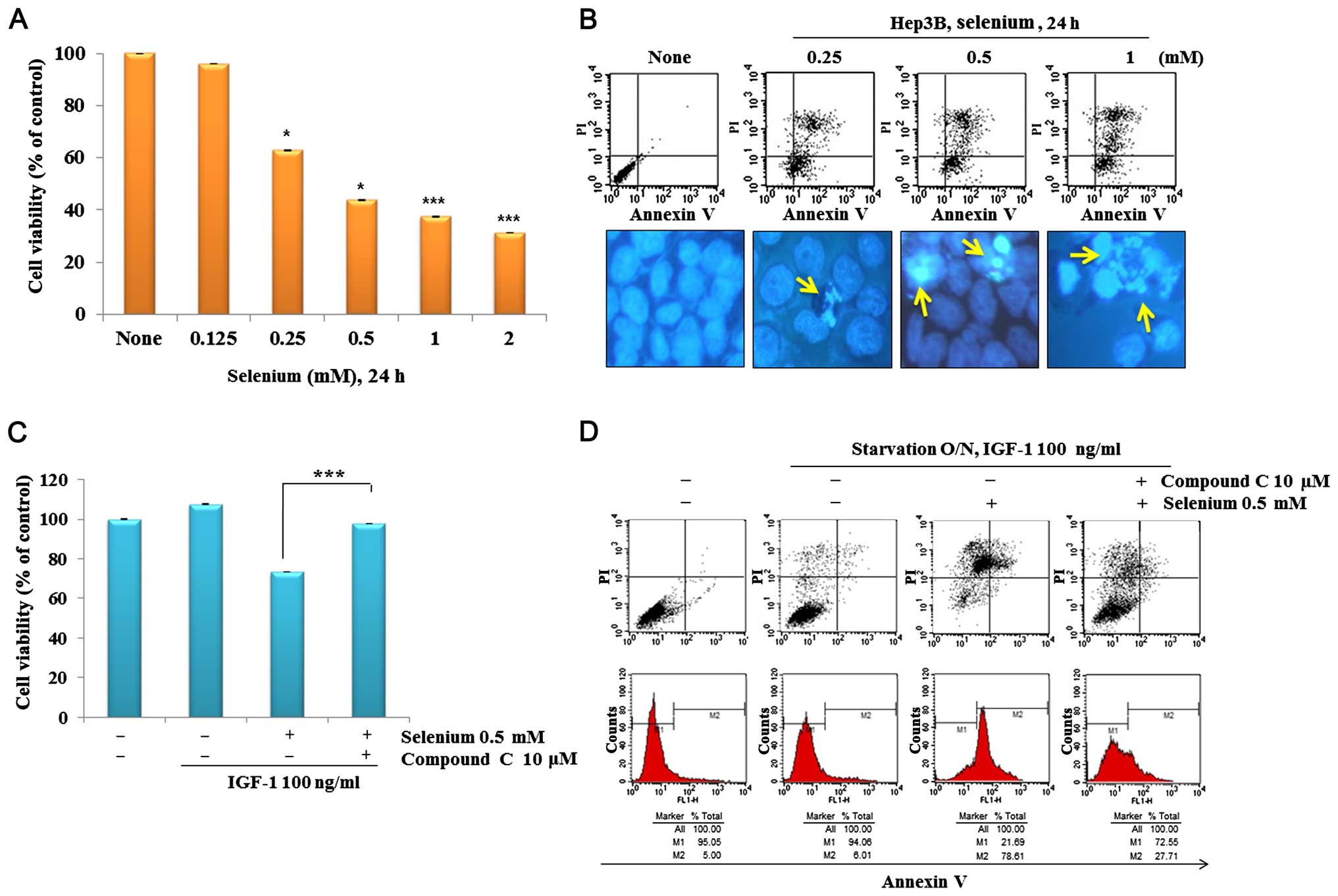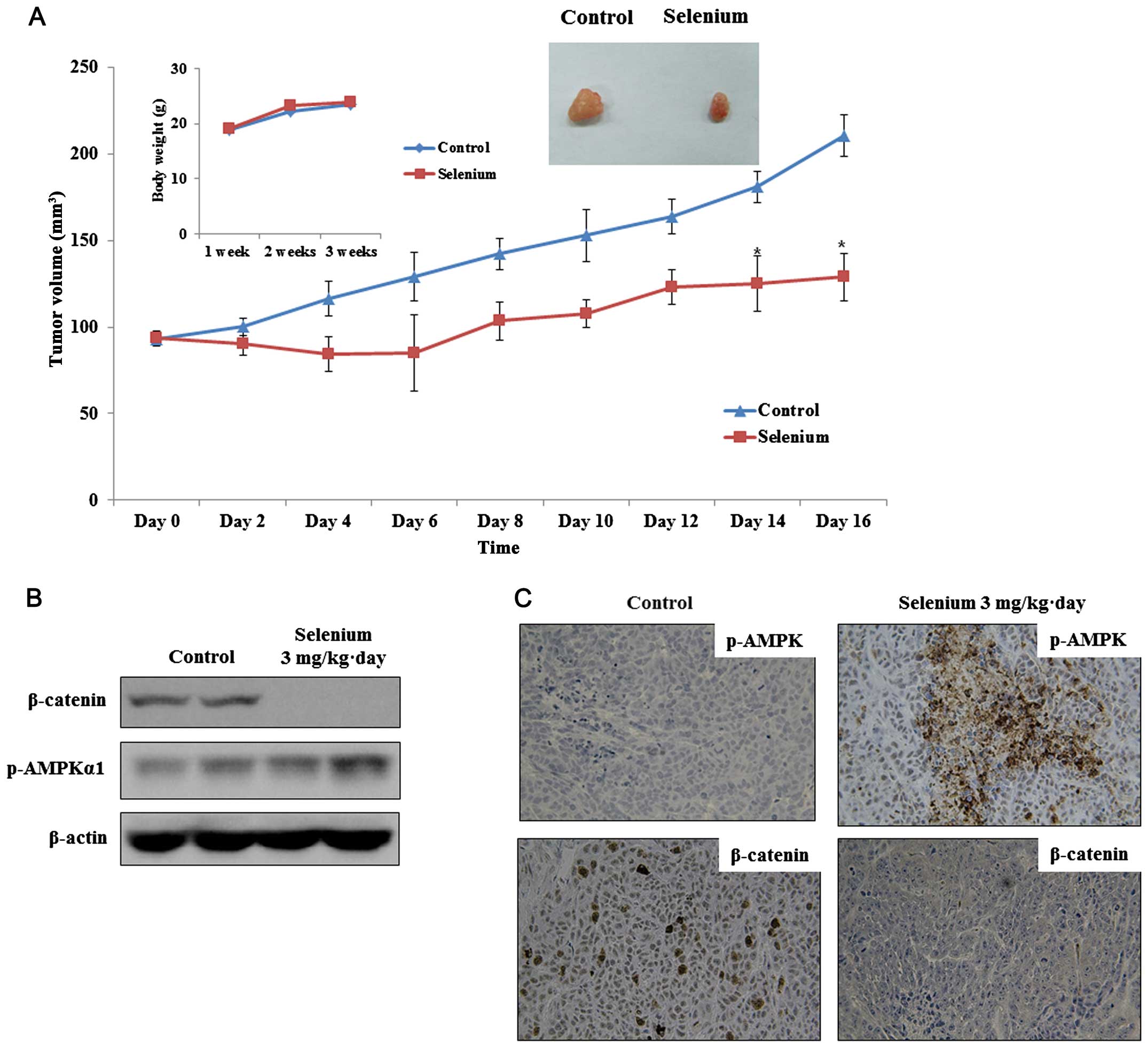|
1
|
Wu M, Kang MM, Schoene NW and Cheng WH:
Selenium compounds activate early barriers of tumorigenesis. J Biol
Chem. 285:12055–12062. 2010. View Article : Google Scholar : PubMed/NCBI
|
|
2
|
Combs GF Jr: Current evidence and research
needs to support a health claim for selenium and cancer prevention.
J Nutr. 135:343–347. 2005.PubMed/NCBI
|
|
3
|
Song H, Hur I, Park HJ, Nam J, Park GB,
Kong KH, Hwang YM, Kim YS, Cho DH, Lee WJ, et al: Selenium inhibits
metastasis of murine melanoma cells through the induction of cell
cycle arrest and cell death. Immune Netw. 9:236–242. 2009.
View Article : Google Scholar
|
|
4
|
Venkateswaran V, Klotz LH and Fleshner NE:
Selenium modulation of cell proliferation and cell cycle biomarkers
in human prostate carcinoma cell lines. Cancer Res. 62:2540–2545.
2002.PubMed/NCBI
|
|
5
|
Zeng H and Combs GF Jr: Selenium as an
anticancer nutrient: Roles in cell proliferation and tumor cell
invasion. J Nutr Biochem. 19:1–7. 2008. View Article : Google Scholar
|
|
6
|
Burk RF, Norsworthy BK, Hill KE, Motley AK
and Byrne DW: Effects of chemical form of selenium on plasma
biomarkers in a high-dose human supplementation trial. Cancer
Epidemiol Biomarkers Prev. 15:804–810. 2006. View Article : Google Scholar : PubMed/NCBI
|
|
7
|
Stein U, Arlt F, Walther W, Smith J,
Waldman T, Harris ED, Mertins SD, Heizmann CW, Allard D, Birchmeier
W, et al: The metastasis-associated gene S100A4 is a novel target
of beta-catenin/T-cell factor signaling in colon cancer.
Gastroenterology. 131:1486–1500. 2006. View Article : Google Scholar : PubMed/NCBI
|
|
8
|
Li VS, Ng SS, Boersema PJ, Low TY,
Karthaus WR, Gerlach JP, Mohammed S, Heck AJ, Maurice MM, Mahmoudi
T, et al: Wnt signaling through inhibition of β-catenin degradation
in an intact Axin1 complex. Cell. 149:1245–1256. 2012. View Article : Google Scholar : PubMed/NCBI
|
|
9
|
Cadigan KM and Nusse R: Wnt signaling: A
common theme in animal development. Genes Dev. 11:3286–3305. 1997.
View Article : Google Scholar
|
|
10
|
MacDonald BT, Tamai K and He X:
Wnt/beta-catenin signaling: Components, mechanisms, and diseases.
Dev Cell. 17:9–26. 2009. View Article : Google Scholar : PubMed/NCBI
|
|
11
|
van de Wetering M, Sancho E, Verweij C, de
Lau W, Oving I, Hurlstone A, van der Horn K, Batlle E, Coudreuse D,
Haramis AP, et al: The beta-catenin/TCF-4 complex imposes a crypt
progenitor phenotype on colorectal cancer cells. Cell. 111:241–250.
2002. View Article : Google Scholar : PubMed/NCBI
|
|
12
|
Ihara A, Koizumi H, Hashizume R and
Uchikoshi T: Expression of epithelial cadherin and alpha- and
beta-catenins in nontumoral livers and hepatocellular carcinomas.
Hepatology. 23:1441–1447. 1996.PubMed/NCBI
|
|
13
|
Takatani T, Minagawa M, Takatani R,
Kinoshita K and Kohno Y: AMP-activated protein kinase attenuates
Wnt/β-catenin signaling in human osteoblastic Saos-2 cells. Mol
Cell Endocrinol. 339:114–119. 2011. View Article : Google Scholar : PubMed/NCBI
|
|
14
|
Subramaniam N, Sherman MH, Rao R, Wilson
C, Coulter S, Atkins AR, Evans RM, Liddle C and Downes M:
Metformin-mediated Bambi expression in hepatic stellate cells
induces prosurvival Wnt/β-catenin signaling. Cancer Prev Res.
5:553–561. 2012. View Article : Google Scholar
|
|
15
|
Lee YK, Park SY, Kim YM, Kim DC, Lee WS,
Surh YJ and Park OJ: Suppression of mTOR via Akt-dependent and
-independent mechanisms in selenium-treated colon cancer cells:
Involvement of AMPKalpha1. Carcinogenesis. 31:1092–1099. 2010.
View Article : Google Scholar : PubMed/NCBI
|
|
16
|
Ip C, Dong Y and Ganther HE: New concepts
in selenium chemoprevention. Cancer Metastasis Rev. 21:281–289.
2002. View Article : Google Scholar
|
|
17
|
Saifo MS, Rempinski DR Jr, Rustum YM and
Azrak RG: Targeting the oncogenic protein beta-catenin to enhance
chemotherapy outcome against solid human cancers. Mol Cancer.
9:3102010. View Article : Google Scholar : PubMed/NCBI
|
|
18
|
Lee YC, Tang YC, Chen YH, Wong CM and Tsou
AP: Selenite-induced survival of HuH7 hepatoma cells involves
activation of focal adhesion kinase-phosphatidylinositol
3-kinase-Akt pathway and Rac1. J Biol Chem. 278:39615–39624. 2003.
View Article : Google Scholar : PubMed/NCBI
|
|
19
|
Jiang C, Kim KH, Wang Z and Lü J: Methyl
selenium-induced vascular endothelial apoptosis is executed by
caspases and principally mediated by p38 MAPK pathway. Nutr Cancer.
49:174–183. 2004. View Article : Google Scholar : PubMed/NCBI
|
|
20
|
Fang W, Han A, Bi X, Xiong B and Yang W:
Tumor inhibition by sodium selenite is associated with activation
of c-Jun NH2-terminal kinase 1 and suppression of beta-catenin
signaling. Int J Cancer. 127:32–42. 2010. View Article : Google Scholar :
|
|
21
|
Hwang JT, Kim YM, Surh YJ, Baik HW, Lee
SK, Ha J and Park OJ: Selenium regulates cyclooxygenase-2 and
extracellular signal-regulated kinase signaling pathways by
activating AMP-activated protein kinase in colon cancer cells.
Cancer Res. 66:10057–10063. 2006. View Article : Google Scholar : PubMed/NCBI
|
|
22
|
Chen Ban K, Singh H, Krishnan R and Fong
Seow H: Comparison of the expression of β-catenin in hepatocellular
carcinoma in areas with high and low levels of exposure to
aflatoxin B1. J Surg Oncol. 86:157–163. 2004. View Article : Google Scholar : PubMed/NCBI
|
|
23
|
Stauffer JK, Scarzello AJ, Andersen JB, De
Kluyver RL, Back TC, Weiss JM, Thorgeirsson SS and Wiltrout RH:
Coactivation of AKT and β-catenin in mice rapidly induces formation
of lipogenic liver tumors. Cancer Res. 71:2718–2727. 2011.
View Article : Google Scholar : PubMed/NCBI
|
|
24
|
Ban KC, Singh H, Krishnan R and Seow HF:
GSK-3beta phosphorylation and alteration of beta-catenin in
hepatocellular carcinoma. Cancer Lett. 199:201–208. 2003.
View Article : Google Scholar : PubMed/NCBI
|















